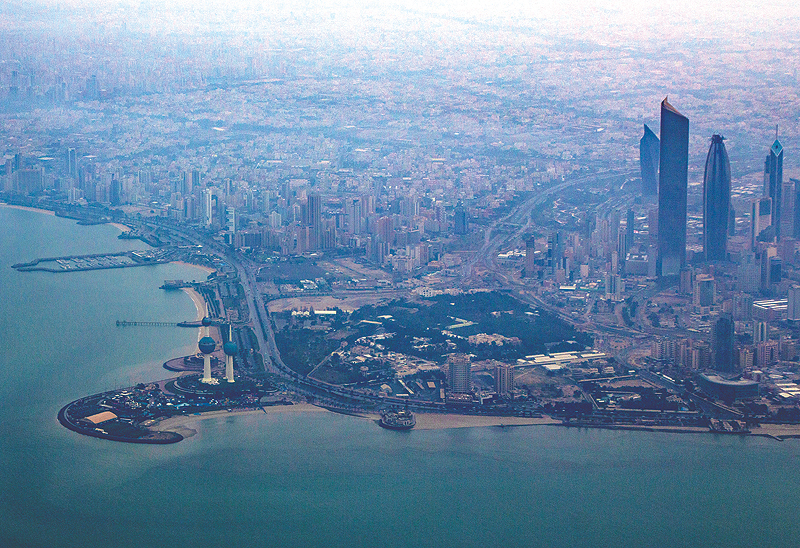Minister forms national committee to limit use of antibiotics
KUWAIT: Manpower authority teams inspected worksites at the ministries' complex parking site to make sure labor law number 6/2010 and domestic helpers' law number 68/2015 are put into practice. The inspection campaign resulted in citing 43 violations of article 18, seven violations of article 20 and three violations of article 18 (sheepherders), deputy director for planning and development at the Public Authority for Manpower Mubarak Al-Azmi said.
Meanwhile, the manpower authority's deputy director for planning and development Dr Mubarak Al-Jafour said the authority completed preparing a proposal to be submitted to the Cabinet concerning exempting some businesses from a condition that sets a minimum number of national labor each business must hire. Jafour explained that the exempted businesses include those with less than 25 workers, shepherds, hunters, agricultural laborers and those working in places of worship.
Expat experts
Minister of Social Affairs and Labor Saad Al-Kharraz said 19 expats had been appointed at the ministry as experts, in addition to 30 others at the public authority for disabled affairs (seven appointed and 23 working for monthly payments) since Jan 2017 till May 14, 2019. According to official statistics Kharraz sent to MP Safa Al-Hashem in response to an inquiry about the total number of expats appointed during the abovementioned period, the 19 appointed expats include four Egyptians, four Indians, three Syrians, three Bangladeshis, two Jordanians, a Saudi, an Iraqi and a Pakistani.
Statistics also explained that the appointed expats work as automated system creators, data and document analysts, office boys, software programmers, computer engineers, typist, technician assistant, legal researcher, senior translator and a teacher. Kharraz explained that expats appointed at the disabled authority include three Egyptians, two Indians, a Tunisian and a Jordanian, while those hired for monthly payments include 13 Egyptians, four bedoons, two Saudis, and Indian, an Ethiopian, an Afghan and a Bangladeshi. Kharraz added expats appointed at the ministry get between KD 190 and 1,400, while those working for the authority get KD 190 to KD 1,883, adding that they had been appointed to make use of their experience.
Antibiotic use
Health Minister Sheikh Dr Basel Al-Sabah ordered the formation of a national committee to limit the use of antibiotics, and that in response to UN and WHO resolutions concerning rationalizing antibiotic use. The committee will be headed by the Health Ministry's assistant undersecretary for technical affairs. The committee will be responsible for implementing the national strategy to rationalize the use of antibiotics in compliance with the latest international developments and in a way that protects patients and the society from the complications and burdens caused by antibiotic-resistant microbiological infections. The committee will be also responsible for studying and assessing the current situation and use, track down any antibiotic-resistant cases, create a national database with information about prescribing and using antibiotics in various public and private health facilities, organize awareness campaigns, support the conduct of related research and surveys, take part in making reports to be submitted to WHO and other international organizations and make use of the experience of experts at those organizations.
Solar power
Responding to a proposal made by municipal councilmember Meshaal Al-Hamdhan concerning installing solar power panels in unused areas in various cemeteries, Kuwait Municipality Director Ahmad Al-Manfouhi stressed that cemeteries should not be used for other purposes. Manfouhi added that the Ministry of Awqaf had been consulted in this regard and that the ministry confirmed the rejection for the same reasons. In other news, Manfouhi said the traffic department project and the Salmiya modernization plan aim to improve the area's structure and organization. Manfouhi added that through Kuwait's structural plan, Kuwait Municipality studies various areas to estimate each area's needs of infrastructure, roads and transport according to its population density.
MoE revenues
A State Audit Bureau report showed that the Ministry of Education (MoE) had rented 43 public schools to be used as private ones without tendering, which reduced the ministry's revenues and deprived the state treasury from KD 1,458,000 because of renting some of the schools for long period of up to 15 years without increasing the rent value.
The report made about the fiscal year 2018-2019 also showed that MoE failed to retrieve fines from some contractors and wasted KD 5,860 on a World Bank agreement. The report stressed that KD 434,940 in violations had been detected in lease contracts for buildings used as female teachers' hostels, through paying rent for unused apartments for over 22 months. In addition, the report showed KD 633,000 had been wasted on the electronic educational portal project that has been delayed for over six years without use, and thus the maintenance period expired before the project even got off the ground.
By Meshaal Al-Enezi and A Saleh










